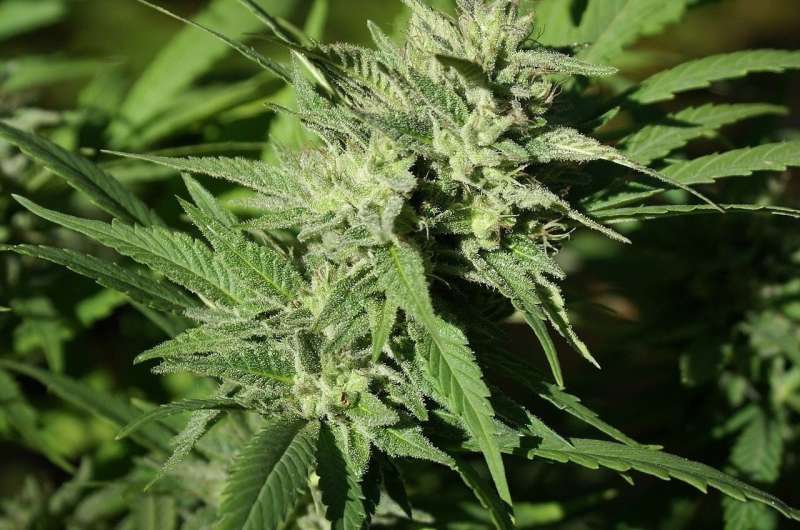This article has been reviewed according to Science X's editorial process and policies. Editors have highlighted the following attributes while ensuring the content's credibility:
fact-checked
peer-reviewed publication
trusted source
proofread
Cannabis intoxication triggers cognitive mechanism of addiction, finds study

New research from the Institute of Psychiatry, Psychology & Neuroscience (IoPPN) at King's College London and the University of Oxford has found that the main component of cannabis, delta-9-tetrahydrocannabinol (THC), leads to people's attention being more drawn to other cannabis stimuli when using the drug, which researchers suggest could underpin the cognitive mechanisms behind cannabis use disorder (CUD).
The research, published in Addiction, also found that levels of cannabidiol (CBD) typically found in cannabis had no modulating effects on the participants, despite many users believing this to be the case.
Over the course of four sessions, researchers asked 46 infrequent cannabis users (using cannabis less than once a week) to inhale a cannabis vapor containing 10mg of THC, and either 0, 10, 20, or 30mg of CBD. They were then given a task designed to measure what they focused on more when given the choice between options of images (cannabis stimuli vs. neutral and food stimuli vs. neutral).
Researchers found that the acute inhalation of THC resulted in people being more drawn to cannabis-related cues without explicitly liking it more.
Researchers also wanted to establish if the CBD content of the vapor had any effect on the results. Previous research has suggested that high doses of CBD (400mg–800mg) can reduce cannabis use in individuals with CUD.
However, researchers in this study found that CBD, when delivered at the levels typically found in available products, had no effect.
"Cannabis addiction has no one single cause but is rather caused by an interplay of various risk factors when combined with prolonged frequent use. Our study shows that people with no history of addiction display similar cognitive mechanisms we see in people who have CUD when they are intoxicated. A better understanding of how THC induces these changes can lead to new treatments and measures that prevent CUD," says Dr. Amir Englund, the study's joint lead author from King's IoPPN.
Professor Philip McGuire from the University of Oxford, the study's joint senior author, said, "While THC did not increase participants' overall liking of cannabis, it increased their sensitivity to cannabis-related stimuli. This suggests that exposure to THC, even when infrequent, may increase the risk of a cannabis use disorder."
Dr. Dominic Oliver, the study's joint lead author from the University of Oxford said, "Following these findings, it is important for people who use cannabis to reflect on their cannabis use to recognize behavior that could lead to addiction. We would now want to explore these behaviors in people using cannabis infrequently and frequently, as well as exploring the effects of different doses of THC using both inhaled and oral routes of administration."
More information: Dominic Oliver et al, Cannabidiol does not attenuate acute delta‐9‐tetrahydrocannabinol‐induced attentional bias in healthy volunteers: A randomised, double‐blind, cross‐over study, Addiction (2023). DOI: 10.1111/add.16353


















